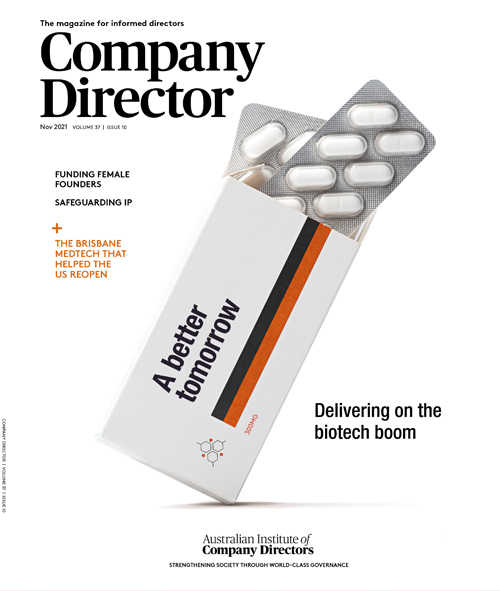The remarkable global scaling of visual communications platform Canva underscores a latent pool of entrepreneurial talent hungry for funding — and female investors are backing female founders to make an impact.
Australian design platform Canva made global headlines in September when a US$200m funding round sent its valuation rocketing to US$40b, making it one of the fastest-growing software companies to date. See Canva story in our June 2019 issue.
On 15 September, company founders Melanie Perkins, Cliff Obrecht and Cameron Adams announced a funding round led by T Rowe Price, with strategic investors including Franklin Templeton, Sequoia Capital Global Equities, Bessemer Venture Partners, Greenoaks Capital, Dragoneer Investments, Blackbird, Felicis, and AirTree. Surging demand for visual communication and online collaboration drove exceptional growth across many industries, said T Rowe Price Global Technology Fund portfolio manager Alan Tu.
With 60 million monthly active users in 190 countries, Canva had more than doubled its revenue year on year, on track to exceed US$1b in annualised revenue by the end of 2021 while generating positive free cashflows. After doubling its workforce from 1000 to 2000 in the past year, the company says it expects to again double its team in the year ahead.
Founded in 2013 by Perkins and Obrecht, Canva had early backing both in Australia and the US from Blackbird Ventures, Square Peg Capital, AirTree, Matrix, InterWest and 500 Startups.
In Canva’s $3m seed round, it attracted the attention of angel investors like Bill Tai, former Facebook director of engineering Lars Rasmussen, Yahoo! CFO Ken Goldman and Seek co-founder Paul Bassat. Perkins also made headlines for another reason — she and Obrecht announced plans to commit the majority of their 30 per cent equity to the Canva Foundation “to do good in the world”.
In the tech world, unicorns like Canva are a rarity. More rare, though, is backing for female founders and the success of Perkins’ powerful vision comes as research has identified a chasm in investor funding for female led startups. The issue was a subject of discussion at the recent Australia Summit hosted by Morgan Stanley. Emma-Jane Newton MAICD, managing director of Morgan Stanley’s investment banking division, spoke on the opportunities and challenges facing women who are founding, leading and investing in Australian technology firms.
“Australia’s place on the world stage as an incubator of high-growth companies is gaining global attention, as Canva demonstrates,’’ says Newton, adding that there remains a substantial opportunity to increase funding and investing by women, for women. ”Mel Perkins and Canva are a fantastic example, but there are so many more. While we have made some great progress, more opportunity remains for women leading the investment decisions in VC and private equity.”
Startups co-founded by women in Australia received 27 per cent of venture capital funding in the first half of 2021, up from 15 per cent in prior years, according to research by Cut Through Ventures “This is an important capital pool for directors to understand because venture capital and private equity capital pools are growing and this is where some of the largest wealth creation events are occurring,” says Newton, noting that in 2020, there was $77b in Australia-focused private capital with $8b raised, almost double the 2019 figure.
She notes there has been a substantial increase in private equity and investment fund-led public to private bids in Australia in 2021, and more VC- backed technology companies listing on the ASX.
Data dive
2021
(first half)
27% of venture capital funding received for startups were co-founded by women
15% increase in 2021 on prior years
Source: Cut Through Ventures
Latest news
Already a member?
Login to view this content



